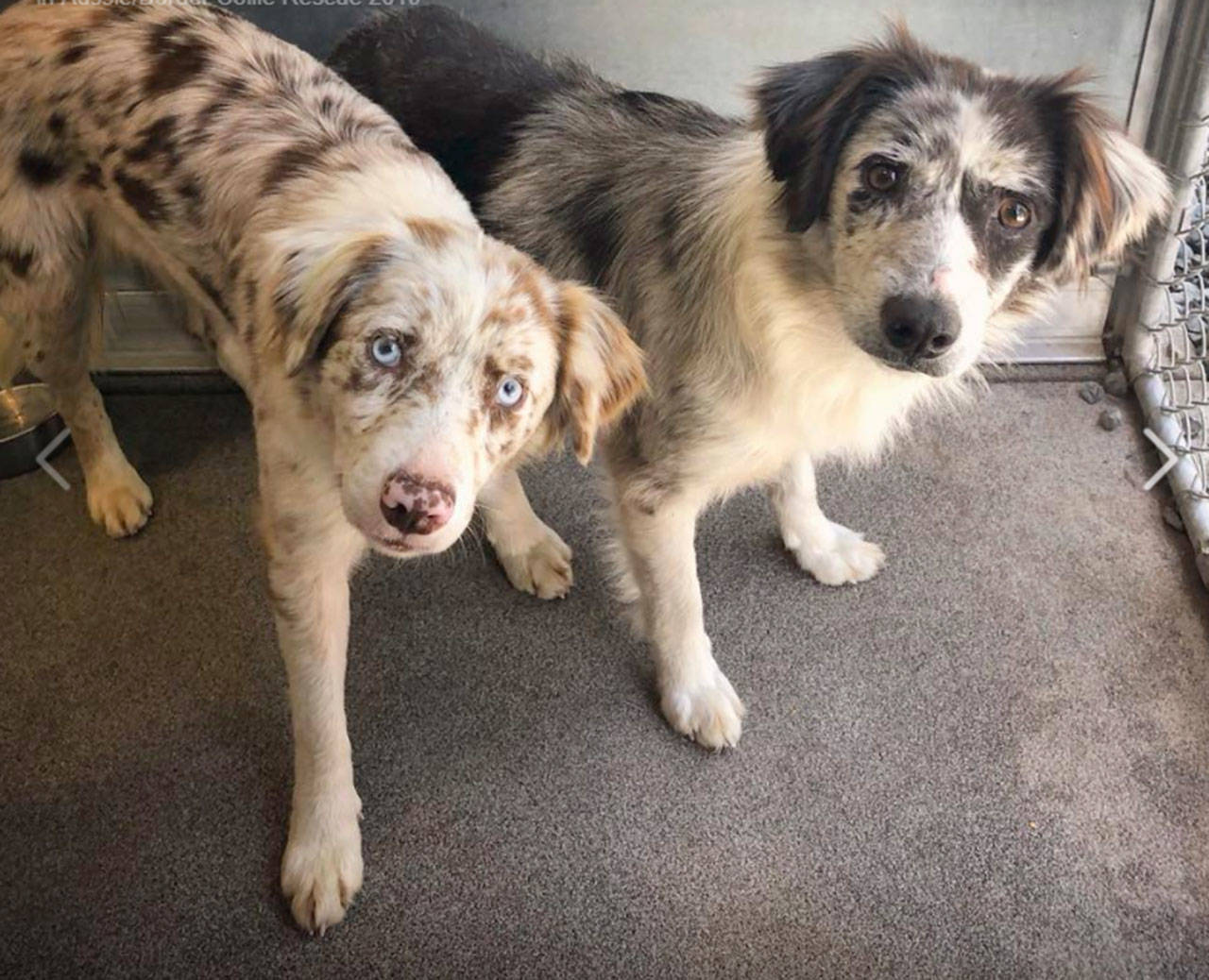Five weeks after being rescued from what pet advocates said were unhealthy and dangerous conditions at an Agnew home, most of the more than two-dozen Australian Shepherd-Border Collies are still adjusting to their new, cleaner surroundings.
In mid-May, after Clallam County animal control officer Tracy Kellas and staff initially rounded up eight dogs, volunteers with Welfare for Animals Guild (WAG) spent the next 10 days rounding up about two dozen more canines at the Agnew residence after its owner died.
The majority of the dogs had skin issues, fleas and broken teeth, WAG volunteers said. The dogs were not spayed/neutered, none were housebroken and most had serious trust, emotional and psychological issues, they said.
Though none were aggressive, WAG members said, the dogs struggled during the initial trapping and then reclusive in new surroundings.
After the dogs went to the Olympic Peninsula Humane Society for initial shots and evaluation, four of the least healthy canines went to Center Valley Animal Rescue in Quilcene while the remaining dogs have found temporary homes at the Humane Society and WAG.
“We were already operating at pretty close to maximum capacity when this situation arose,” Mel Marshall, WAG Half Way Home Ranch Manager, said. “We had to scramble to shift dogs into foster homes and out to our prison program to accommodate these rescues.”
Luanne Hinkle, executive director at the Olympic Peninsula Humane Society, said eight of the dogs OPHS initially took in have been transferred to dog rescues in Washington state where they can get one-on-one care. The remaining 11, she said, are at the Humane Society’s facility just off Old Olympic Highway between Sequim and Port Angeles.
The dogs are at varying levels of comfortability with staff, she said.
“Two are really, really friendly, two are mildly friendly (while the) other ones are so fearful they don’t want anything to do with anyone,” Hinkel said.
“We are giving them a lot of TLC.”
At the WAG Half-Way Home facility off McComb Road, about a dozen of the rescued dogs are “making huge progress towards trusting and responding to human kindness,” volunteers said early this week — including allowing harnesses and walks around the property.
WAG held special classes for volunteers to work with the rescued dogs.
“It started with just sitting in a room and not looking at them or making any sudden movements, letting them come to you in order to establish trust,” Marshall said.
No timeline on adoptions
Hinkle said none of the dogs brought to the Humane Society have been adopted and they probably won’t wind up with a family or individual unprepared for a dog with special needs.
“I believe the majority are not going to be your family dog, sleeping at your feet,” she said. “These particular dogs, because of the way they have been treated, are so unsociable it’s difficult to tell (how they will react). It’s a very slow go. They’ve taken a lot of work. We kind of consider them special needs dogs.”
But, Hinkle noted, “they’re all healthy and they’re eating.”
At the WAG facility, organization president Barb Brabant said she is hopeful that soon the organization will be able to start evaluating potential homes.
“It’s so exciting to be met with wagging tails and smiles, but they’re not quite there yet, and we don’t want to release them until we’re sure they’re ready,” she said.
Facility needs
Brabant said that because of the influx of rescue dogs, WAG volunteers have had to turn several people seeking to turn over dogs to the nonprofit.
“A lot of the dogs we receive need help either in training or socialization skills and they will stay with us as long as they need to,” Brabant said. “It is important to WAG that our dogs heal both physically and emotionally before we start looking for their forever homes.”
Because of the Agenw rescue, WAG board members held a strategic planning session last week to seek potential improvements — including possible expansion, increased training, reaching out for more foster families, etc.
“The outpouring of volunteering and support has been phenomenal,” stated Brabant. “We just need to find a way for our infrastructure to catch up to demand of the dogs and families needing help.”
OPHS was at maximum capacity after the initial influx of the Agnew dogs, Hinkle said, but recent adoptions mean the facility has a bit more room to spare, as of last week.
The rescued dogs won’t be going anywhere for a while, Hinkle said.
“It’s a costly endeavor, but that’s what we do,” she said.
For more about the Olympic Peninsula Humane Society, see www.ophumane society.org or call 360-457-8206.
For more about Welfare for Animals Guild, see www.wagsequimwa.com.
Vet donates services to rescued dogs
Linda Allen and several members of her staff at Pacific Northwest Veterinary Hospital in Sequim donated their time to spay and neuter 10 of the Aussie-Border Collie WAG rescues from the May 19 rescue in Agnew.
“It is fortunate we were able to get them all done in one day; Dr. Allen and her staff were amazing,” WAG president Barb Brabant said.
Once the dogs were under anesthesia, Dr. Allen was able to evaluate each dog and help with their skin conditions, microchip, cut nails, as well as the surgery, Brabant said. One dog had an infection that if not contained would have probably resulted in death in less than a week, she said.
“We have an amazing community that is willing to do this for us,” Brabant said. “Since we are mostly a volunteer organization, we have to pay these expenses out of our budget. This was truly a generous gift of both time and money and shows the spirit of the community coming together.”



